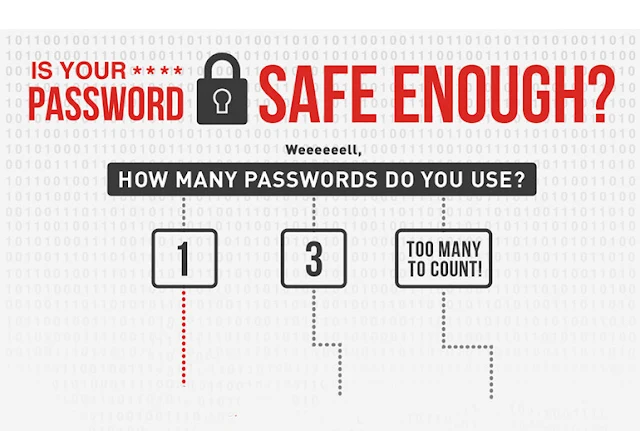Is Your Password Secure Enough?
Is Your Password Secure Enough?
 |
| Is Your Password Secure Enough? |
We have a good reason why Netflix warns users to change their passwords. When successful giants like LinkedIn, Yahoo, eHarmony, Yahoo and many more have had problems with security breaches and cracked passwords, one should seriously consider creating a more robust password. In this new era of cybercrime, no person is protected from potential compromise attacks and keyloggers. Keying in "incorrect" or "I no longer know" as passwords may be humorous to some, nevertheless they are extremely insecure. And security is, in no way, a laughing matter. If you feel those passwords are bad, check out this set of the 10 worst, and unconfident, passwords on the internet*:
- 123456 (#1 for the next straight year)
- pass word (#2 for the third straight year)
- 12345
- 12345678
- football
- qwerty
- 1234567890
- 1234567
- princess
- 1234
Of course there are ways of creating a more secure username and password, however, concerning massive digital breaches lately, we can get around rather than just steering clear of the "popular" clich? is actually like "qwerty123" or "loveme123456". Six letter passwords do not withstand high-quality great software either. So here are a few things to consider when making your password more secure:
Length and difficulty
On this fast-paced digital time, today's computers are extremely quick and efficient, as opposed to machines of a decade ago. This implies it is much easier today for a cyber lawbreaker or hacker to make quick work out of an unsuspecting victim's professional or personal info. Large numbers of password leaks are being reported consistently, yet so many simply decline to understand why security password length and complexity are so important.
A bare minimum of eight characters in a password is considered, in certain circles, to be sufficient. But we recommend that you take into account 16 to 20 characters, or even more. 1 should make easy-to-remember sentence in your essay passwords, random phrases or even song lyrics as it should be more than enough for firmer security for your systems and devices.
Thinking exterior the box is essential. Even if popular articles suggest unique ideas for your password, it is not a good idea to take them with no consideration. Invent your own design which only you will remember. Hackers tend to keep updated on latest trends. They can be informed about popular patterns and will be more than happy to try out these password hints.
Password patterns
There are a great deal of Star Wars followers in the world with solid familiarity with the business and universe. Hackers know this. Additionally they know that "maytheforcebewithyou", for instance, is a common estimate when looking to hack someone's username and password.
Master Yoda would recommend using the standard mix of upper-case characters, emblems and numbers. Nevertheless , this practice is complex and you should not use the same difficult pass word with your accounts. If perhaps thieves get their hands on one password, you can guess they will put it to use on your other accounts.
Additionally, a 2013 study for Federal Security Advanced Research Projects Company, by Korelogic reports that there is a common pattern in the upper-case, symbol, and number security passwords that folks use. The style goes like this: first character is upper-case, used by 5 or six lowercase, then 3 quantities or year of delivery. The regular mistakes are adding a first upper-case notification, ending the password with an exclamation mark and not scattering the quantities between the characters.
The advice would be to utilize a multiple term phrase with approximately sixteen characters, or more, consisting of random words. For example, "correcthorsebatterystaple", which is made up of of four common british words, but considered so random that in order for any hacking software to try and comprehend it, 550 years with 1000 guesses per second would be needed. **
Are You Writing your passwords down?
Notepads refuses to cut it either. One of a kind passwords are tough, so people typically write them down. Many people make the mistake of leaving notes with credit greeting card passwords in their pocket or stuck in a job drawer. While web thieves don't have the technology to get into your pieces of paper, your loved ones users, roommates, colleagues, maintenance workers and others do. Which in turn probably goes against most businesses security best methods.
This is how password manager programs can help. The simple software utilizes an Expert Password way of keeping your invaluable passwords with a single phrase. You can build extremely secure and unique passwords and will only have to remember one password to retrieve them. Programs like 1Password, Keepass, Dashlane, LastPass, Sticky Pass word and others, conserve treasured info and ultimately, time and money.
Differing your password
It should be noted that this is not exactly the most proper method for dealing with cyber removes. Changing it every 3-4 months is not necessarily the best idea because you will have to keep in mind each and every pass word. You should change your password if there have been a massive security breach on the webpage or service, so you should stay updated on the latest news.
Reliability questions are just as important. The strongest username and password can and will fall due to a poor security answer. The questions usually are your single mother's maiden name, the location you were born in, and catastrophe can occur if hackers have this info. All of that can be easily obtained by Facebook or other leftover information on interpersonal media, depending from your personal privacy settings.
Taking things in account
To sum up, you cannot find any foolproof method of creating a truly secure password. We can only make the effort to strengthen these passwords and protect our networks and essential information.
You may also be interested: 5 Benefits of VPN for Your Business
- Usually make unique passwords with memorable combinations of words, symbols and numbers that do not resemble the normal patterns like "Doolittle1982! inch, or "7LittlePiglets#".
- Always use long, 16-character passwords which are complex enough but easy to keep in mind
- Never type your name, address, or year in your security password
- Consider by using a password director
- Unless you're living by itself, do not jot down account details on sticky records
- Prevent using 12345 number chain combinations
- Avoid using the Top 25 Worst Accounts, according to SlashDot



Comments
Post a Comment